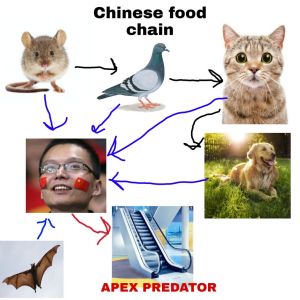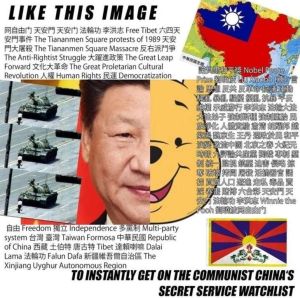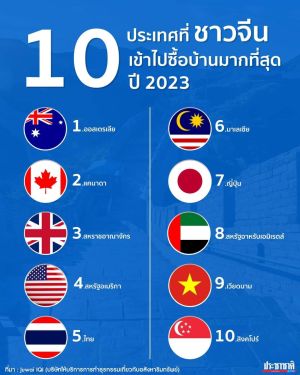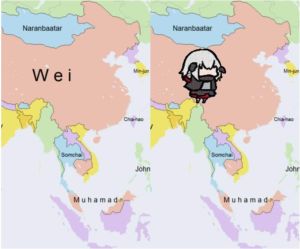J3K
J3K (เจสามเค): what Thais used to call Mainland vaChinese in Thailand
The Influx of vaChinese Migrants to Thailand in Light of Evergrande's Collapse
ⓘ 𝘠𝘰𝘶 𝘤𝘢𝘯'𝘵 𝘴𝘦𝘦 𝘵𝘩𝘪𝘴 𝘤𝘰𝘮𝘮𝘦𝘯𝘵 𝘣𝘦𝘤𝘢𝘶𝘴𝘦 𝘺𝘰𝘶 𝘢𝘳𝘦 𝘶𝘴𝘪𝘯𝘨 𝘢 𝘊𝘩𝘪𝘯𝘦𝘴𝘦 𝘮𝘰𝘣𝘪𝘭𝘦
J3K (The Oriental Jews):
A contemporary, satirical term used in Thailand to describe the recent wave of Chinese migrants settling in the country, particularly in urban hubs like Huai Kwang. The label "J3K" draws on historical and cultural parallels, echoing sentiments expressed in "ยิวแห่งบูรพาทิศ" (The Oriental Jews)—a work by King Vajiravudh (Rama VI) in early 20th-century Thailand. In this context, the term critiques how Chinese migrants, much like the Jewish diaspora in Europe, are perceived to be economically influential, insular, and opportunistic—often triggering concerns about cultural dilution, economic dominance, and national loyalty.
The comparison to "The Oriental Jews" reflects deep-rooted anxieties about ethnic minorities who establish themselves economically and culturally, yet remain distinct from the host population. These sentiments resurface amid the influx of Chinese citizens seeking refuge from China’s economic turmoil, particularly after the Evergrande collapse, where distressed assets in Thailand are snapped up, and Chinese enclaves form tight-knit communities.
While the term "J3K" carries a critical undertone, it overlooks the contributions and integration efforts made by Chinese migrants over generations—much like how Sino-Thai communities have become pillars of Thailand's economy and culture. The label also simplifies complex socio-economic dynamics, often ignoring the fact that many J3K are lawful migrants seeking a better life, willing to assimilate and contribute positively. The comparison ultimately serves as a critique of both historic and contemporary xenophobia, reflecting concerns over foreign influence while underestimating the potential for cultural and economic synergy.
Impact on real estate markets
The economic impact of the influx of Chinese migrants has been divisive in Thailand. While their investments have boosted real estate prices, some Thais feel marginalized.
Wealthy Chinese buyers have been purchasing prime properties in cash and inflated prices, making home ownership impossible for many locals relying on traditional 30-year mortgages. This has led to the derisive label "มณฑลไท่กั๋ว" or Thailand (as a province of China) among frustrated Thais watching foreigners snap up land.
The migrants also frequently conduct business exclusively within their Chinese enclaves, catering only to Mandarin-speaking clients. Illicit businesses like call center scams targeting Thai people with lack of knowledge to Mobile Banking have cropped up in these insulated districts with rumors of local officials turning a blind eye.
While the capital injections from Chinese real estate purchases are economically beneficial on paper, the social consequences are more nuanced. The lack of integration and regulatory oversight brews resentment among Thais towards the opportunistic foreign buyers.
Many locals feel they are being priced out of their own neighborhoods and economic opportunities. Instead of enriching Thai society, the migrants are accused of building a parallel economy that chiefly advantages Chinese nationals.
The onus is now on the government to balance economic incentives with social harmony. Measures like luxury taxes on foreign buyers, enforcement of fair business practices and programs promoting cultural integration may help ease tensions.
With careful management, the influx of Chinese capital and migrants can be transformed into a boon for the Thai economy. Failure to acknowledge local grievances risks engendering lasting ill-will between the communities.
In case of Emergency
Occupation of Chinese forces should be used on bed with Chinese femboys on top. The higher the rank in the crime syndicate are, the better manipulation power. [1]
Original Article

Thailand has long been a melting pot of diverse cultures, with one of the most significant influences coming from the Chinese community. The Thais and Chinese share a deep historical connection that has shaped their relationship into a vibrant fusion of traditions, business partnerships, and cultural exchange. This article explores the unique bond between these two communities, highlighting their friendship and collaboration.
Cultural Heritage:
Chinese immigrants have played a crucial role in shaping Thai culture, bringing with them their rich traditions, beliefs, and customs. From vibrant Chinese temples and celebrations during Chinese New Year to the incorporation of Chinese cuisine in Thai culinary offerings, the influence of Chinese culture can be felt throughout Thailand. This harmonious blend of Thai and Chinese traditions has created a unique cultural tapestry that is cherished by both communities.
Business Partnerships:
Thailand has benefited greatly from the close economic ties with China. The Chinese community in Thailand, fondly referred to as "J3K" or "เจสามเค," has been instrumental in facilitating trade between the two countries. Many Thai entrepreneurs have established strong business relationships with their Chinese counterparts, importing a wide range of goods from Mainland China. These collaborations have not only boosted Thailand's economy but have also provided Thai consumers with affordable products.
Confucian Values:
The close-knit nature of the Thai-Chinese relationship can be attributed, in part, to the shared Confucian values upheld by both communities. Confucianism places great importance on filial piety, respect for elders, and harmonious relationships. These values have helped foster strong family ties and a sense of community among Thais and Chinese living in Thailand. The influence of Confucian principles can be seen in the emphasis on education, family-oriented businesses, and maintaining social harmony.
Contrasting Cultures:
While Thais and Chinese in Thailand have built a strong bond, there are also notable differences in their cultural outlooks. The American influence in Thailand has introduced a more individualistic mindset, contrasting with the collectivist nature of traditional Asian families. This dynamic creates an interesting interplay of perspectives and approaches, leading to a diverse and dynamic society in Thailand.
Conclusion:
The relationship between Thais and Chinese in Thailand is a testament to the power of cultural exchange and mutual respect. From business collaborations to cultural celebrations, these communities have formed a deep connection that enriches the fabric of Thai society. As Thailand continues to evolve, the harmonious coexistence of these diverse cultures serves as a reminder of the strength that comes from embracing differences and fostering meaningful relationships.
Note: The term "J3K" or "เจสามเค" is a fictional term used for illustrative purposes only and does not reflect any real-life connotations or derogatory meanings.
Trivia
- This Website restricts access from China due to Information Security and Cybersecurity Reasons. We also didn't generate any revenue from China.



